Mehrzad Samadi
NVIDIA Nemotron 3: Efficient and Open Intelligence
Dec 24, 2025Abstract:We introduce the Nemotron 3 family of models - Nano, Super, and Ultra. These models deliver strong agentic, reasoning, and conversational capabilities. The Nemotron 3 family uses a Mixture-of-Experts hybrid Mamba-Transformer architecture to provide best-in-class throughput and context lengths of up to 1M tokens. Super and Ultra models are trained with NVFP4 and incorporate LatentMoE, a novel approach that improves model quality. The two larger models also include MTP layers for faster text generation. All Nemotron 3 models are post-trained using multi-environment reinforcement learning enabling reasoning, multi-step tool use, and support granular reasoning budget control. Nano, the smallest model, outperforms comparable models in accuracy while remaining extremely cost-efficient for inference. Super is optimized for collaborative agents and high-volume workloads such as IT ticket automation. Ultra, the largest model, provides state-of-the-art accuracy and reasoning performance. Nano is released together with its technical report and this white paper, while Super and Ultra will follow in the coming months. We will openly release the model weights, pre- and post-training software, recipes, and all data for which we hold redistribution rights.
Nemotron 3 Nano: Open, Efficient Mixture-of-Experts Hybrid Mamba-Transformer Model for Agentic Reasoning
Dec 23, 2025Abstract:We present Nemotron 3 Nano 30B-A3B, a Mixture-of-Experts hybrid Mamba-Transformer language model. Nemotron 3 Nano was pretrained on 25 trillion text tokens, including more than 3 trillion new unique tokens over Nemotron 2, followed by supervised fine tuning and large-scale RL on diverse environments. Nemotron 3 Nano achieves better accuracy than our previous generation Nemotron 2 Nano while activating less than half of the parameters per forward pass. It achieves up to 3.3x higher inference throughput than similarly-sized open models like GPT-OSS-20B and Qwen3-30B-A3B-Thinking-2507, while also being more accurate on popular benchmarks. Nemotron 3 Nano demonstrates enhanced agentic, reasoning, and chat abilities and supports context lengths up to 1M tokens. We release both our pretrained Nemotron 3 Nano 30B-A3B Base and post-trained Nemotron 3 Nano 30B-A3B checkpoints on Hugging Face.
Scaling Test-Time Compute to Achieve IOI Gold Medal with Open-Weight Models
Oct 16, 2025



Abstract:Competitive programming has become a rigorous benchmark for evaluating the reasoning and problem-solving capabilities of large language models (LLMs). The International Olympiad in Informatics (IOI) stands out as one of the most prestigious annual competitions in competitive programming and has become a key benchmark for comparing human and AI-level programming ability. While several proprietary models have been claimed to achieve gold medal-level performance at the IOI, often with undisclosed methods, achieving comparable results with open-weight models remains a significant challenge. In this paper, we present \gencluster, a scalable and reproducible test-time compute framework that attains IOI gold-level performance using open-weight models. It combines large-scale generation, behavioral clustering, ranking, and a round-robin submission strategy to efficiently explore diverse solution spaces under limited validation budgets. Our experiments show that the performance of our proposed approach scales consistently with available compute, narrowing the gap between open and closed systems. Notably, we will show that GenCluster can achieve a gold medal at IOI 2025 for the first time with an open-weight model gpt-oss-120b, setting a new benchmark for transparent and reproducible evaluation of reasoning in LLMs.
NVIDIA Nemotron Nano 2: An Accurate and Efficient Hybrid Mamba-Transformer Reasoning Model
Aug 21, 2025



Abstract:We introduce Nemotron-Nano-9B-v2, a hybrid Mamba-Transformer language model designed to increase throughput for reasoning workloads while achieving state-of-the-art accuracy compared to similarly-sized models. Nemotron-Nano-9B-v2 builds on the Nemotron-H architecture, in which the majority of the self-attention layers in the common Transformer architecture are replaced with Mamba-2 layers, to achieve improved inference speed when generating the long thinking traces needed for reasoning. We create Nemotron-Nano-9B-v2 by first pre-training a 12-billion-parameter model (Nemotron-Nano-12B-v2-Base) on 20 trillion tokens using an FP8 training recipe. After aligning Nemotron-Nano-12B-v2-Base, we employ the Minitron strategy to compress and distill the model with the goal of enabling inference on up to 128k tokens on a single NVIDIA A10G GPU (22GiB of memory, bfloat16 precision). Compared to existing similarly-sized models (e.g., Qwen3-8B), we show that Nemotron-Nano-9B-v2 achieves on-par or better accuracy on reasoning benchmarks while achieving up to 6x higher inference throughput in reasoning settings like 8k input and 16k output tokens. We are releasing Nemotron-Nano-9B-v2, Nemotron-Nano12B-v2-Base, and Nemotron-Nano-9B-v2-Base checkpoints along with the majority of our pre- and post-training datasets on Hugging Face.
Llama-Nemotron: Efficient Reasoning Models
May 02, 2025



Abstract:We introduce the Llama-Nemotron series of models, an open family of heterogeneous reasoning models that deliver exceptional reasoning capabilities, inference efficiency, and an open license for enterprise use. The family comes in three sizes -- Nano (8B), Super (49B), and Ultra (253B) -- and performs competitively with state-of-the-art reasoning models such as DeepSeek-R1 while offering superior inference throughput and memory efficiency. In this report, we discuss the training procedure for these models, which entails using neural architecture search from Llama 3 models for accelerated inference, knowledge distillation, and continued pretraining, followed by a reasoning-focused post-training stage consisting of two main parts: supervised fine-tuning and large scale reinforcement learning. Llama-Nemotron models are the first open-source models to support a dynamic reasoning toggle, allowing users to switch between standard chat and reasoning modes during inference. To further support open research and facilitate model development, we provide the following resources: 1. We release the Llama-Nemotron reasoning models -- LN-Nano, LN-Super, and LN-Ultra -- under the commercially permissive NVIDIA Open Model License Agreement. 2. We release the complete post-training dataset: Llama-Nemotron-Post-Training-Dataset. 3. We also release our training codebases: NeMo, NeMo-Aligner, and Megatron-LM.
Nemotron-H: A Family of Accurate and Efficient Hybrid Mamba-Transformer Models
Apr 10, 2025

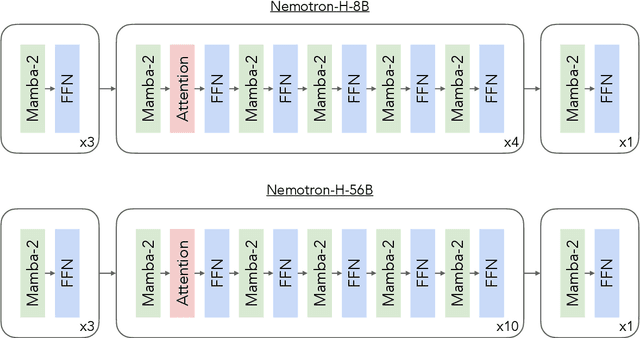
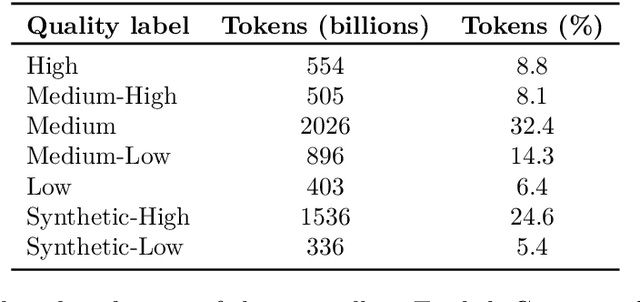
Abstract:As inference-time scaling becomes critical for enhanced reasoning capabilities, it is increasingly becoming important to build models that are efficient to infer. We introduce Nemotron-H, a family of 8B and 56B/47B hybrid Mamba-Transformer models designed to reduce inference cost for a given accuracy level. To achieve this goal, we replace the majority of self-attention layers in the common Transformer model architecture with Mamba layers that perform constant computation and require constant memory per generated token. We show that Nemotron-H models offer either better or on-par accuracy compared to other similarly-sized state-of-the-art open-sourced Transformer models (e.g., Qwen-2.5-7B/72B and Llama-3.1-8B/70B), while being up to 3$\times$ faster at inference. To further increase inference speed and reduce the memory required at inference time, we created Nemotron-H-47B-Base from the 56B model using a new compression via pruning and distillation technique called MiniPuzzle. Nemotron-H-47B-Base achieves similar accuracy to the 56B model, but is 20% faster to infer. In addition, we introduce an FP8-based training recipe and show that it can achieve on par results with BF16-based training. This recipe is used to train the 56B model. All Nemotron-H models will be released, with support in Hugging Face, NeMo, and Megatron-LM.
OpenCodeInstruct: A Large-scale Instruction Tuning Dataset for Code LLMs
Apr 05, 2025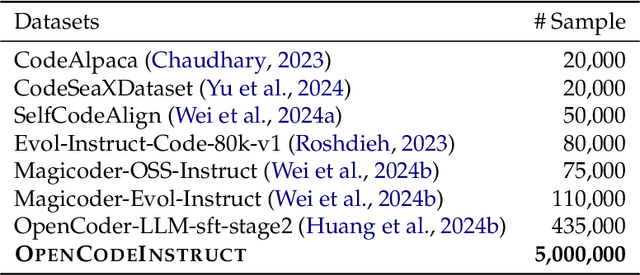

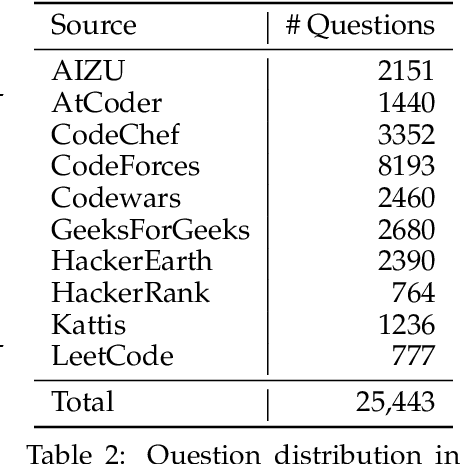
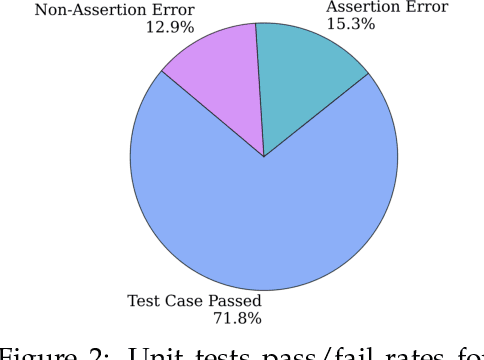
Abstract:Large Language Models (LLMs) have transformed software development by enabling code generation, automated debugging, and complex reasoning. However, their continued advancement is constrained by the scarcity of high-quality, publicly available supervised fine-tuning (SFT) datasets tailored for coding tasks. To bridge this gap, we introduce OpenCodeInstruct, the largest open-access instruction tuning dataset, comprising 5 million diverse samples. Each sample includes a programming question, solution, test cases, execution feedback, and LLM-generated quality assessments. We fine-tune various base models, including LLaMA and Qwen, across multiple scales (1B+, 3B+, and 7B+) using our dataset. Comprehensive evaluations on popular benchmarks (HumanEval, MBPP, LiveCodeBench, and BigCodeBench) demonstrate substantial performance improvements achieved by SFT with OpenCodeInstruct. We also present a detailed methodology encompassing seed data curation, synthetic instruction and solution generation, and filtering.
Rethinking Numerical Representations for Deep Neural Networks
Aug 07, 2018



Abstract:With ever-increasing computational demand for deep learning, it is critical to investigate the implications of the numeric representation and precision of DNN model weights and activations on computational efficiency. In this work, we explore unconventional narrow-precision floating-point representations as it relates to inference accuracy and efficiency to steer the improved design of future DNN platforms. We show that inference using these custom numeric representations on production-grade DNNs, including GoogLeNet and VGG, achieves an average speedup of 7.6x with less than 1% degradation in inference accuracy relative to a state-of-the-art baseline platform representing the most sophisticated hardware using single-precision floating point. To facilitate the use of such customized precision, we also present a novel technique that drastically reduces the time required to derive the optimal precision configuration.
 Add to Chrome
Add to Chrome Add to Firefox
Add to Firefox Add to Edge
Add to Edge